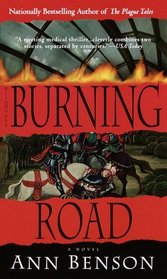Helpful Score: 2
Sequel to The Plague Tales, this book continues the stories of Dr. Alejandro Canches in the 1350's and Dr. Janie Crowe in 2007. In the Plague Tales, Janie gets Alejandro's journal and in this book, she begins to learn his story as her own plague story continues to unfold. Somewhat footloose since a sweeping plague killed her husband and daughter a few years previous, Janie tries to get reinstated in her position as a top-notch neurologist instead of working her dead-end job as a research assistant. When she stumbles upon a rare bone defect that seems to be affecting only Jewish boys who attended a certain Hebrew camp, she begins a covert search that can get her in big trouble with the all-pervasive 'Big Brother-esque' government. Excellent read--I really enjoy this type of book where the two stories, one past and one present, are separate and yet intricately connected.
Helpful Score: 1
This is the follow up book to The Plague Tales by the same author. not as well done,but a wonderful, yet long read!
the story goes between current times and ancient times in the times of the plague and its aftermath
the story goes between current times and ancient times in the times of the plague and its aftermath
Helpful Score: 1
I really enjoyed this book...I love historical fiction, and this book connected history with modern times, and it was a great read.
Helpful Score: 1
As in the first book, "The Plague Tales", the 14th Century characters and storyline are more interesting and developed than the 21st Century portion of this book.
This is a must read if you enjoyed The Plague Tales, but the ending is not complete. Two characters just drop out of the story towards the end, leaving their storylines dangling. I wonder if the author just got tired of the book or if this was a very poor cliffhanger tactic to lead into a third book?
This is a must read if you enjoyed The Plague Tales, but the ending is not complete. Two characters just drop out of the story towards the end, leaving their storylines dangling. I wonder if the author just got tired of the book or if this was a very poor cliffhanger tactic to lead into a third book?
Helpful Score: 1
I haven't yet read Benson's The Plague Tales, so I cannot compare its sequel, The Burning Road, to it. This is a historic-fantasy novel, containing romance and aspects of a medical thriller. It alternates between 14th-century France and 21st century Massachusetts. Both settings are threatened by plagues, and in both parts of the novel brave, iconoclastic, and vulnerable physicians are trying to cure people from the pandemic diseases facing their societies while facing great personal risk.
By linking her two physicians through 600 years, Ann Benson skillfully shows us events that both connect and separate these two doctors as they struggle with medical and personal problems.
I found the modern-day chapters full of tension but not as compelling as the chapters set in ancient times; perhaps because the response to the 21st century plague seemed too Draconian, perhaps because Benson didn't present characters who were actually sick with the illness, or perhaps because it was set in the present day, and our actual present does not jibe with the present in the novel.
In contrast, the bubonic plagues of the Middle Ages are a well-documented part of European history, as are the other historic aspects of the 14th century chapters of the book, including the need for many Jews to conceal their status in order to survive in Catholic Spain and France. I liked the chapters set in the Middle Ages much better.
By linking her two physicians through 600 years, Ann Benson skillfully shows us events that both connect and separate these two doctors as they struggle with medical and personal problems.
I found the modern-day chapters full of tension but not as compelling as the chapters set in ancient times; perhaps because the response to the 21st century plague seemed too Draconian, perhaps because Benson didn't present characters who were actually sick with the illness, or perhaps because it was set in the present day, and our actual present does not jibe with the present in the novel.
In contrast, the bubonic plagues of the Middle Ages are a well-documented part of European history, as are the other historic aspects of the 14th century chapters of the book, including the need for many Jews to conceal their status in order to survive in Catholic Spain and France. I liked the chapters set in the Middle Ages much better.




